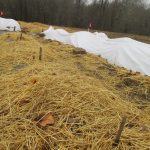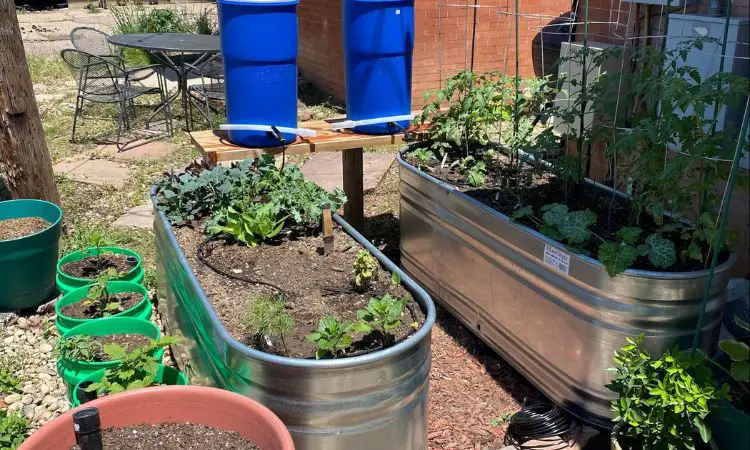Protecting your garden hose from freezing is really important so it stays in good shape and works well. To keep a garden hose from freezing, insulate it with foam pipe insulation and store it indoors during winter.
Some other best method that you can follow to keep a garden hose from freezing is to-
- Find a Warm Place: Keep your hose in a warm spot, like a basement or a cozy room.
- Insulate Outside Taps: Put insulation around outdoor faucets and water lines.
- Disconnect the Hose: Take the hose off from all the outdoor faucets.
- Let It Drip: Allow the faucets to have a small trickle of water. This stops ice from forming.
- Empty Water Lines: Drain all the water out of the outdoor water lines.
- Use a Freeze Miser: Try a gadget called the Freeze Miser. It drips just enough water to stop freezing when it gets too cold.
Extra Tips: Here are a few more ideas:
- Wrap the hose with heat tape.
- Get rid of extra water.
- Keep your garage doors shut.
- Open kitchen and bathroom cabinet doors to let warm air in.
Garden hoses are essential tools for maintaining a lush and healthy garden, but freezing temperatures can cause them to become damaged or unusable.
So, overall to protect your garden hose from freezing, you can follow the details techniques to prevent this problem.
Can Temperature Make Your Garden Hose Freeze?
Yes, when the temperature goes to 32℉ (0℃) or colder, your garden hose can freeze. Unlike the water pipes inside your walls, which stay okay until it’s -7℃ (20℉), your hose is outside.
So, just one cold night can freeze the water in it.
But if the temperature fluctuation is more than 0℃ then, you can be sure not to freeze it. But if it does a frequent 5-7 hours is enough to freeze the hose pipe.
In that situation, you have to take the initiative or follow some effective techniques to solve this problem.

How to Keep a Garden Hose From Freezing? ( 4 Methods )
Though we will talk here about most of the effective and proven ways, however, its is not the final method that you have to maintain in your garden.
But these methods are widely used by different gardeners and they are happy with the results. Here are these proven techniques-
1) Use a Heated Hose
If you want a quick (just a minute)and effective solution to keep your garden hose from freezing then you can use a heated hose for sure.
You can attach the hose to a spigot and let it open for the flow of water. It will convert from a frozen to a liquid state by intimating the temperature of -40℉ or -40C.
Some of the heated hoses can withstand temperatures of more than -42℉ to 45℉.
Pros of Using a Heated Hose:
- Extreme Cold Resistance
- Quick Installation
- Protects Standard Hoses
- Ease of Use
- Durability
Cons of Using a Heated Hose:
- Initial Cost
- Electricity Usage
- Limited Length

2) Wrap the hose with heat tape/ Cable
This is one of the electric-operated cables that cover up the main hose pipe of the garden. It is programmed with a temperature fluctuation.
That means it will turn on automatically when the temperature is low.
You can integrate it by using high-temp tape and make a distance of about 5-7 inches into the hose pipe.
After doing it, plug it in and peacefully water your garden for as long as you want.
Pros of Using a Heat Cable:
- Cost-Effective
- Versatility
- Customizable
- Energy Efficient
- Warranty
Cons of Using a Heat Cable:
- Installation Required
- Maintenance
- Potential Hazards
- Limited Length
3) Ensure Hose Pipe Insulation
There’s another simple way to make sure your hose doesn’t freeze in the winter.
You can wrap it in insulation.
This helps keep the water warm inside the hose, even when it’s cold outside.
But be careful, if water gets stuck in the hose for a long time, it can still freeze.
So, here’s what you can do:
- Use Self-Adhesive Foam Insulation: This type of insulation sticks easily to the hose and keeps it warm.
- Install Heat Cable First: Before insulating, put a heat cable on the hose to stop ice from forming.
- Wrap It Tightly: When you wrap the hose, make sure there are no gaps where cold air can get in.
We like using foam insulation with adhesive because it’s easy to work with and doesn’t get soggy when it’s outside.
That way, you can still use your hose even after you’ve insulated it.
It’s a smart way to keep things flowing smoothly during the chilly months

4) Install a Freeze Miser on Garden Hose
The best way to keep your hose and pipes from freezing is to install a Freeze Miser.
It is a device that attaches to the end of your hose and drips water to prevent the hose from freezing. It is affordable and easy to use, and it can protect up to 150 feet of hose.
It works by keeping the water in the hose moving, which prevents it from freezing. The water that drips out of the hose also helps to insulate the hose and prevent it from freezing.
Freeze Misers are available at most hardware stores.
Here are some other tips to keep your hose and pipes from freezing:
- Insulate your pipes. You can do this by wrapping them in pipe insulation or by using a heat tape.
- Turn off the water to your hose bibs. This will help to prevent the water in the hose from freezing.
- Drain your hose. This will help to prevent the water in the hose from freezing.
- Open your faucets slightly. This will help to keep the water flowing and prevent it from freezing.
- Keep your hose reel in a warm place. This will help to prevent the hose from freezing.
- If you have a sump pump, make sure it is working properly. This will help to keep your basement dry and prevent pipes from freezing.
How can you tell if your garden hose is frozen, and why is it important?
You need to watch out for signs of a frozen hose because it can lead to problems. Here’s how you can tell if your hose is frozen:
Check the weather: If it’s really cold, especially at night, your hose might freeze.
Look at the hose: See if there’s ice on the outside. A frozen hose can seem stiff and not bend easily.
Try bending it: If it won’t bend and feels hard, it’s probably frozen.
Check water flow: If no water comes out when you turn it on, the hose could be frozen.
Listen for sounds: Sometimes, a frozen hose makes cracking or popping noises as it thaws.
Frozen hoses can cause problems, like bursting or damaging your faucet and nozzle. Using a frozen hose means less water for your plants and can harm them. It’s also risky because a frozen hose can suddenly burst and cause injuries.
To avoid all this trouble, follow these steps:
- Drain the hose after using it.
- Disconnect it from the faucet when it’s freezing outside.
- Store it indoors during winter.
These simple steps will keep your hose safe and make your gardening easier. Don’t let a frozen hose ruin your day.

Why Does Cold Weather Harm Garden Hoses?
When the temperature drops below freezing (0 degrees Celsius), garden hoses can face problems. Here’s what can happen:
Cracking and Splitting: When the water inside the hose freezes, it gets bigger and pushes on the hose walls. This might make the hose crack or split, so you can’t use it anymore.
Less Bendy: Freezing and thawing water in the hose can make it less bendy. It becomes hard to move and handle.
Leaks and Bursts: If water freezes inside and you don’t do anything, it can leak or even burst when the pressure gets too high. That’s not good for your garden or property.
Clogs: Cold weather can also make the water freeze inside the hose, blocking it. This stops the water from going to your garden.
Broken Parts: Ice expanding in the hose can stress the fittings and connectors. They might break, leak, or come off, making the hose not work right.
Why is it important to prevent the hose from freezing?
It’s really important to stop your garden hose from freezing because it can cause problems. Here’s why it matters:
First, it helps your hose work well. When it doesn’t freeze, you can use it for watering plants and cleaning stuff in your garden. That’s pretty handy.
Also, if you stop it from freezing, your hose will last longer. That means you don’t have to buy a new one as often, which can save you money.
Frozen hoses can waste water. They might break and leak water everywhere. When it doesn’t freeze, you use water wisely and save money on your water bill.
Your garden hose is an investment. It’s like something you buy to make your garden nice. If you stop it from freezing, it’ll last a long time and be worth the money you spent on it.
Lastly, dealing with a frozen hose can be really annoying. Imagine needing it for your garden, and it’s all frozen up. Preventing it from freezing saves you from getting frustrated and keeps your gardening on track.
What Precaution To Take to Keep a Garde Hose From Freezing?
To protect your garden hose from freezing, you can:
- Insulate the hose with foam pipe sleeves or self-adhesive insulating tape.
- Drain the hose before the first frost arrives.
- Store the hose in a dry and protected location.
- Disconnect and store accessories, such as spray nozzles or sprinklers.
- Avoid kinks in the hose.
- Maintain proper water pressure.
- Monitor weather forecasts and keep the faucet open slightly.
- Inspect the hose regularly for signs of damage or wear and tear.
Frequently Asked Questions
Will Burying A Hose Keep It From Freezing?
Burying a hose will partially prevent freezing because the water inside the hose will freeze if the temperature is too low. It is recommended to drain the hose before storing it inside to prevent the water from freezing and expanding, which can damage the hose.
As a rule of thumb, the soil temperature e becomes lower if you bury the hose for a few centimeters. So it will sometimes be very helpful if the temperature fluctuation is too low.
How Do I Prevent My Garden Hose From Freezing?
To prevent your garden hose from freezing, make sure to disconnect it from the water source and drain the water completely after use.
And store it indoors, If you don’t want too much hassle using the above 3 techniques will be ok for you.
Try those methods.
What Happens If A Garden Hose Freezes?
When a garden hose freezes, the water inside expands, causing the hose to burst.
This can damage the hose itself, as well as the water source it is connected to.
In some cases, the hose may even break off completely. To prevent this from happening, it is important to drain your garden hose before the winter weather sets in.
You can do this by turning off the water supply to the hose and then opening the nozzle to let the water drain out.
You can also wrap the hose in insulation or bubble wrap to help keep it from freezing. If your hose does freeze, you can try to thaw it out by running warm water over it or by using a hair dryer.
However, if the hose is badly damaged, it may be necessary to replace it.
Conclusion
Protecting your garden hose from freezing during the winter is crucial to ensure its longevity and functionality. I hope the above-mentioned techniques are helpful in eradicating this problem.
If yes, you can let me know if you have other effective ways.
Ref: https://www.wikihow.life/Keep-an-RV-Water-Hose-from-Freezing https://aces.nmsu.edu/ces/yard/2006/120906.html https://www.ehow.com/how_13264_store-garden-hoses.html

I am a graduate of Bangladesh Agricultural University, where I delved into various agricultural disciplines, equipping me with a profound understanding of agriculture. Beyond academics, I have hands-on experience in gardening and crop cultivation. My passion is to embrace sustainable farming and horticulture. With a BSc in Agriculture, I am dedicated to promoting environmentally conscious and efficient agrarian practices.
Bachelor of Science (BSc) in Agriculture (Hons.)
Master of Science. (Sustainable Agriculture & Food Security ) (MS)
Bangladesh Agricultural University



